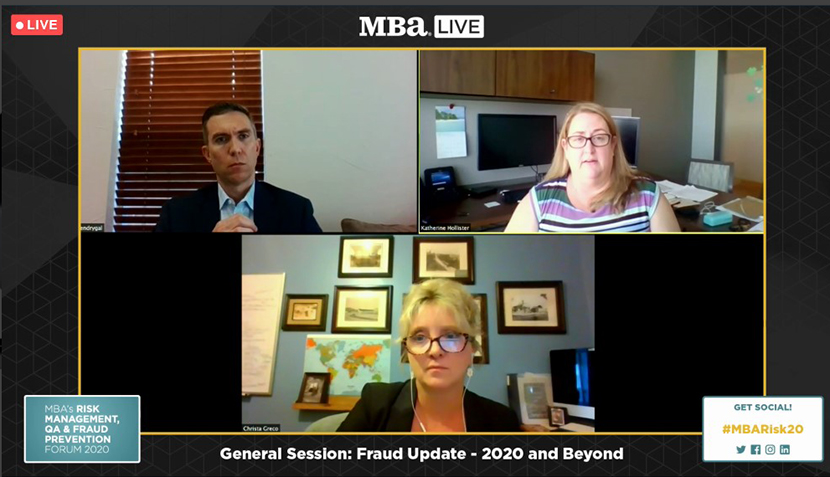
Fraud Update – 2020 and Beyond (MBA LIVE)

The recent—and fast—switch to digital mortgage, remote online notarization and closings have opened the door for new fraud activity.
Speaking yesterday at the Mortgage Bankers Association’s Risk Management, Quality Assurance and Fraud Prevention Forum 2020, Christa Lynn Greco, Intelligence Analyst in the Criminal Investigative Division’s Money Laundering Intelligence Unit with the Federal Bureau of Investigation, said since onset of the coronavirus pandemic, real estate wire fraud has become more prevalent.
“It’s evolving and its growing, Greco said. “It’s an attractive crime because its low-cost and high-return, which makes it desirable for perpetrators. And with the COVID-19 pandemic, it’s created a sense of urgency among some victims.
FBI statistics show real estate write fraud losses increased byy more than 200 percent since 2015. “Nearly 30 percent of all complaints are now real estate wire fraud losses,” she said.
Greco described a “typical” scenario: a criminal actor uses available information online to target a certain audience. He does his research–on Google, on the “Dark web” or on real estate platforms such as Realtor.com, Redfin, Zillow, etc.
“It’s easily obtainable–just about any data that has been aggregated to a certain individual can be obtained,” Greco said. “He then finds some targets, such as ‘people working for real estate escrow companies in Orange County, Calif.’ This gives them a list of people who they can target for compromise. They get the victim to click on an attachment in an email that contains spyware or malware, which gives them access to their computer and monitor emails that go back and forth.
Once they have access to the victim’s computer, the perpetrators can redirect emails, create algorithms to send incoming emails to the trash bin, etc. “Usually, they try to identify clients who are, say, closing a transaction, and watch the timing for when money is going to be transferred,” Greco said. “At that point, they create false emails and give the victims numbers to a routing number that the perpetrator controls. The victims might never realize until it’s too late that they’ve been victimized.”
Once the money has been deposited, Greco said, “money mules” take over, moving the money through a variety of money laundry techniques to get the money out of the U.S. and overseas. “Money mules area problem,” she said. “It’s a vast international network that is hard to crack.”
Since 2018, the Department of Justice and the FBI have launched multiple investigations to deter real estate wire fraud, resulting in hundreds of arrests and millions in recovered funds,” Greco said. “In 2020, we’re trying to close the gap between the money that is lost and what is recovered,” she said. “But time is of the essence–most people who are victimized are embarrassed that it happen, so they delay reporting it, and the longer they delay, the less likely that money is going to be recovered.”
“We see fraud being driven by greed, desperation and opportunity,” Kip Mendrygal, Partner with Locke Lord LLP, Dallas. “We are going through such a fundamental shift in how we are doing business right now—how homes are being shown remotely, being appraised remotely—and we’re going to see a lot more fraud in 2021 and beyond as greed, desperation and opportunity continue.”
Mendrygal said he expects employment verification fraud to accelerate. “We have a lot of people furloughed, laid off—it’s a very fluid environment,” he said. “Employers are trying to be flexible, but aren’t necessarily being helpful.”
Mendrygal encouraged lenders to “go to the next level” in verifying employment. “Employment is the main factor in a person’s ability to make the monthly mortgage payments,” he said. “You have to step up your efforts to verify employment.”
Mendrygal also predicted an increase in forbearance/foreclosure fraud by so-called “experts” in foreclosure mitigation. “We saw a lot of bad actors during the great recession who will offer to repair credit for $2,500—and then walk away with your money,” he said. “The bigger risk this time around is that the criminals are more technologically sophisticated in committing fraud, identity theft and other crimes.”
“Be very aware of your surroundings, your customer and your policies,” Greco said. “A lot of these originated loans might check the boxes but it doesn’t pass the smell test. With the increase in production and volume can wear you down. At some point the country is going to open up again, and when it does, people are going to be overwhelmed and the fraudsters are going to pounce.”
